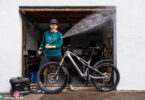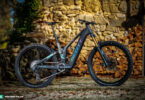GASGAS is probably better known to motocross enthusiasts than e-bike aficionados. With its countless plastic covers, WP-developed suspension and capable coil shock, the GASGAS ECC 6 bridges the emotional gap to the MX world. Can a GASGAS eMTB assert itself against the competition in our huge 2024 group test, or does it feel out of place away from the MX track?
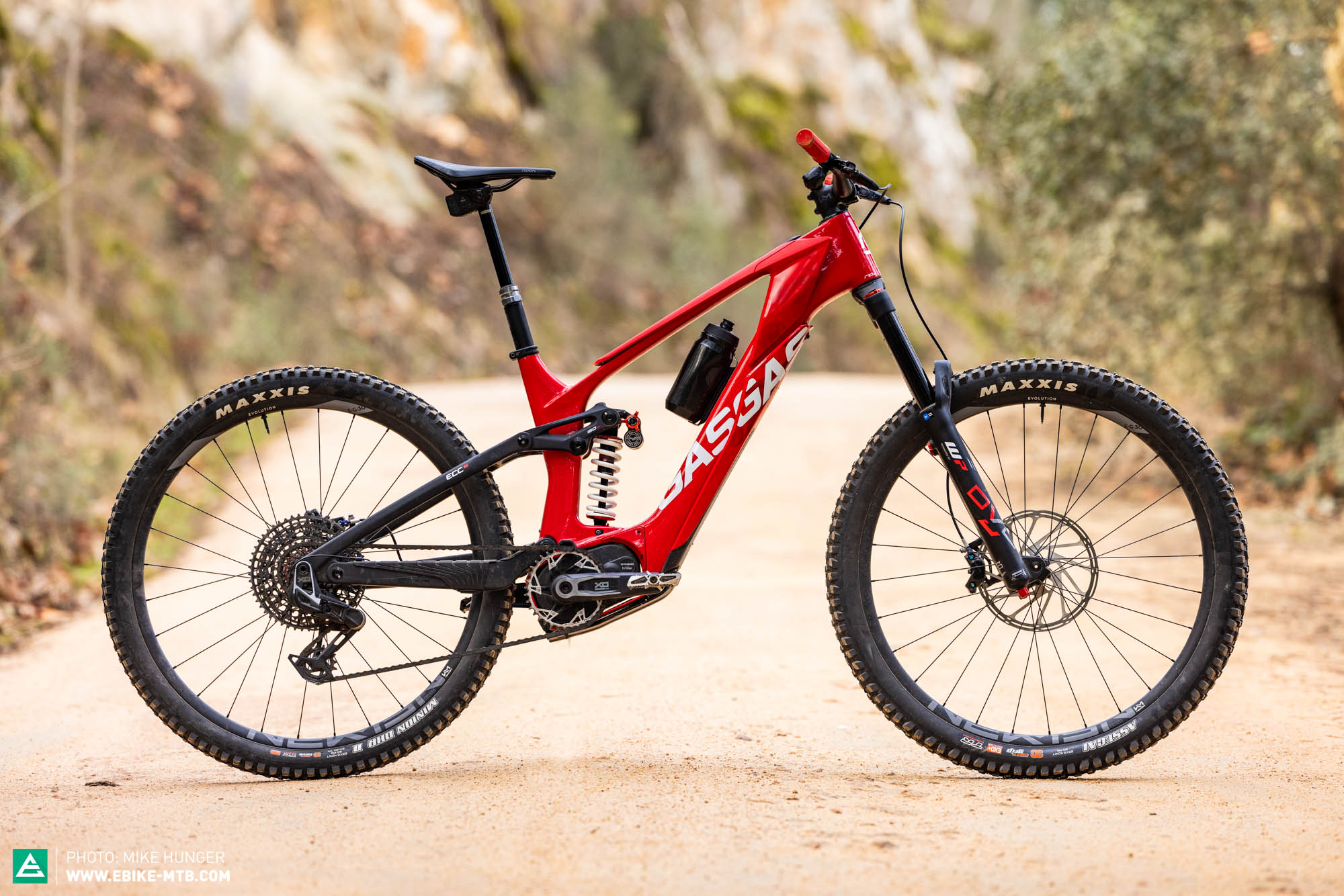
24.6 kg in size M/L | € 9,999 | Manufacturer’s website
GasGas have long been part of the furniture in the motocross and moto trials scene. The Spanish brand is even represented in the Dakar Rally, and debuted in MotoGP in 2023. GasGas were fully acquired by the Pierer Mobility Group in 2020, and they’ve been active in the e-bike segment ever since. However, the GASGAS ECC 6 doesn’t rely on a direct injection 2-stroke motor, but rather comes equipped with a relatively new SRAM Powertrain drive system instead, which delivers 90 Nm of torque and draws its power from a 630 Wh battery. This can be removed from the down tube, and is protected by a plastic cover. And that’s not the only one, because plastic covers seem to be a recurring theme here. Unlike other manufacturers, however, GASGAS don’t try to blend the countless covers into the frame – quite the contrary! They put them right in your face, creating a polarising MX look, and making the GASGAS ECC 6 one of the most unique-looking competitors in this test field, made even more unusual by the SRAM Eagle Powertrain motor, which is only represented twice in the test field.
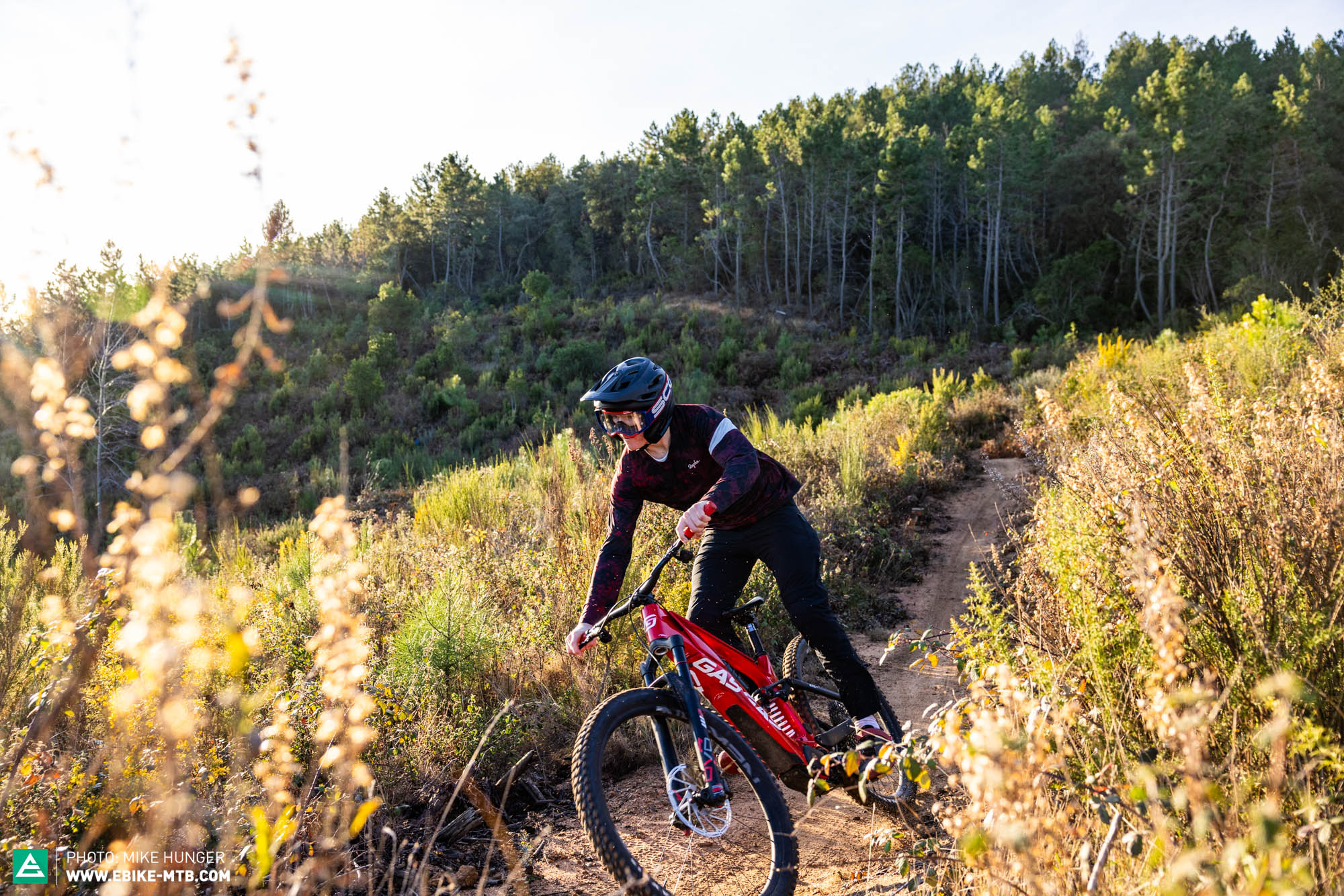
For an overview of the test fleet head to the group test: The best eMTB of 2024 – 27 of the most exciting models in our comparison test
What sets the 2024 GASGAS ECC 6 apart from the competition?
Red paint finish, white decals, striking suspension design and a shedload of plastic panels – the GASGAS eMTB looks a lot like one of their motocross bikes. The panels on the top and down tube act as a double floor above the carbon frame. Underneath them, GASGAS painted cheeky slogans on the frame, like “Your race my party” or “Look! I’m naked”, which come to light as soon as you remove the panels. The covers are only there for aesthetic purposes, and are secured to the frame with simple pressure buttons – only the fender on the down tube in front of the battery is bolted to the frame and can’t be kicked off accidentally. However, our test crew had mixed feelings about the covers – looks are a subjective matter! At least they didn’t interfere with the riding performance of the bike, and they attracted countless nods of approval on and around the test track – and we respect GASGAS for thinking outside of the box! Admittedly, the Spanish brand enjoyed a slight home advantage since we carried out the tests in Santa Coloma de Farners, Spain.
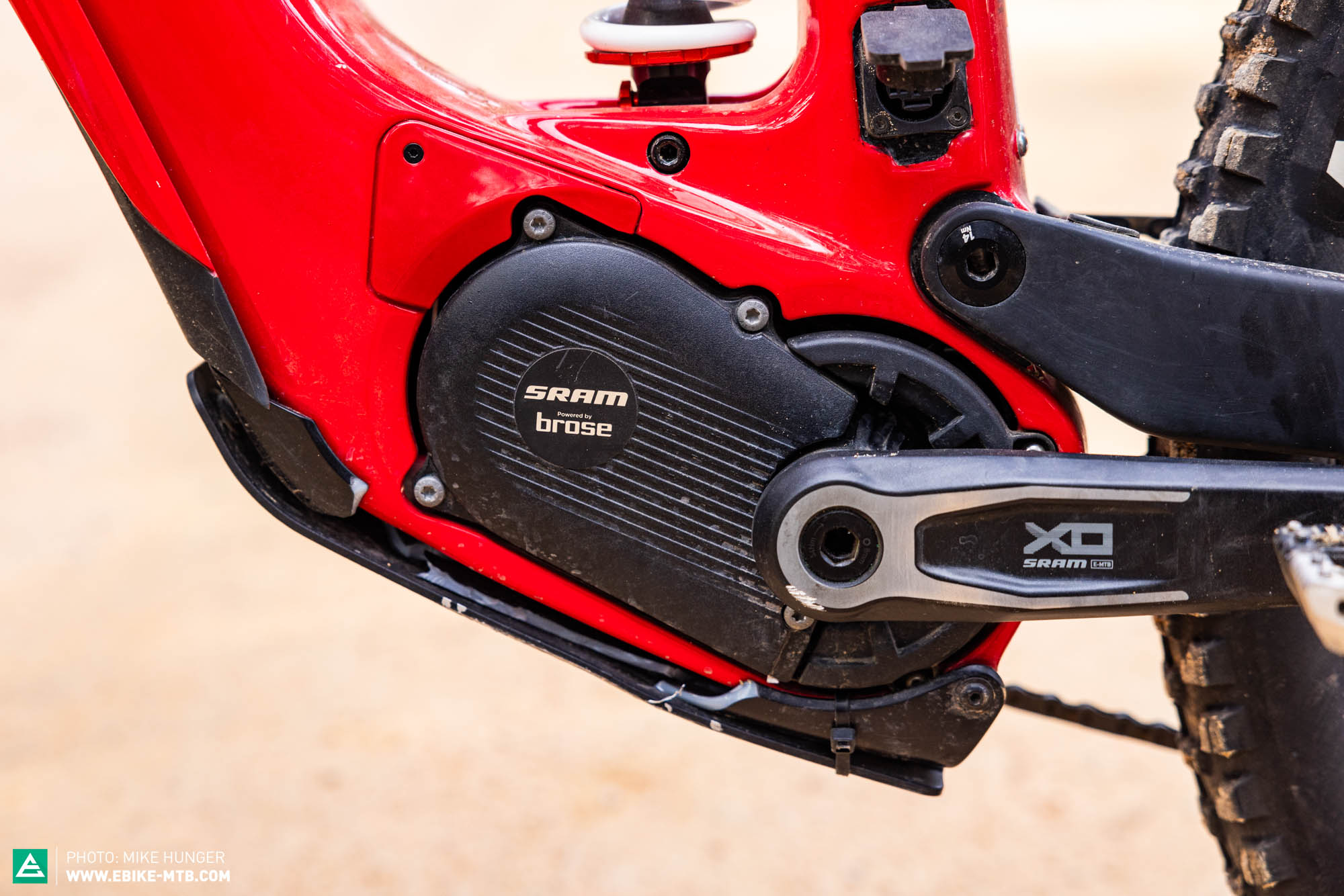
The SRAM Eagle Powertrain motor packs a punch but is nice and quiet thanks to the internal belt drive.
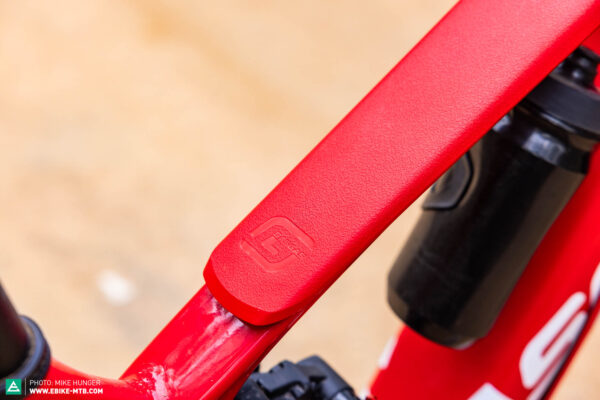
The plastic covers of the GASGAS are little more than just an elaborate design feature and splash guard in front of the battery.
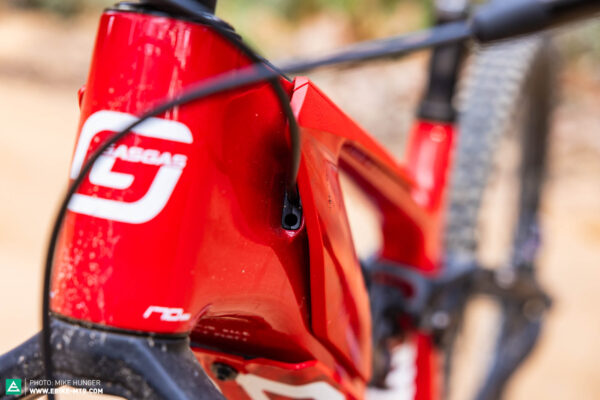
The brake lines disappear into the frame underneath the plastic covers.
Assistance is provided by a SRAM Eagle Powertrain motor, which delivers 90 Nm of torque and is protected against impacts by a chucky metal skid plate. The motor draws its power from a 630 Wh battery, which can be removed from the down tube for external charging – something you might need to do more often, as it has less capacity than most of the other full-fat bikes in this test. To do this, you’ll have to remove two bolts first, which is a bit finicky because one requires a 5 mm Allen key while the other needs a smaller 6 mm. The SRAM AXS Bridge display is integrated into the top tube and ensures good readability. While it reminds us a bit of the Specialized MasterMind TCU display, it offers significantly less information, meaning that you can’t call up performance-relevant data such as the current speed or cadence.
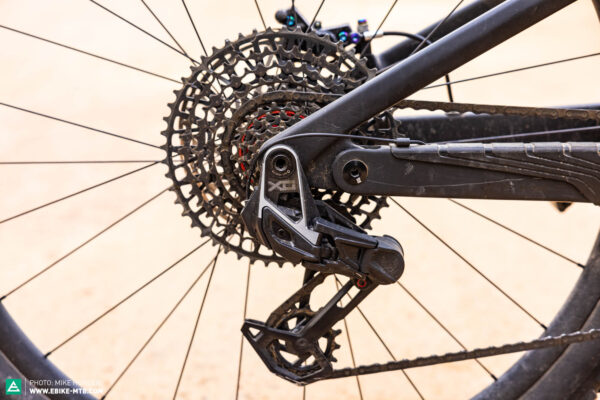
Upon request, the SRAM GX Eagle Transmission shifts gears fully automatically.
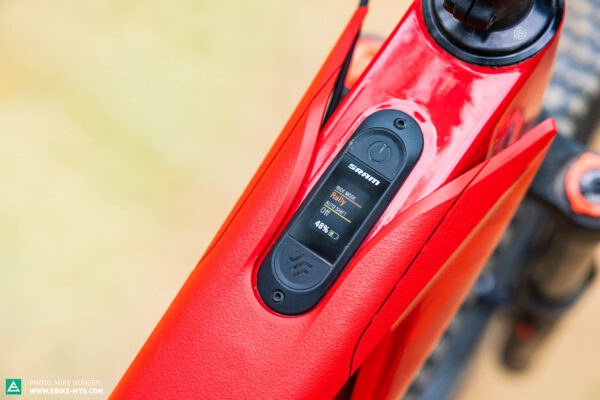
The display of the SRAM motor might look stylish but shows very little information.
The GASGAS’ suspension is the result of a co-operation between WP and DVO – all in the name of moto-nostalgia! DVO have long been an integral part of mountain biking whereas WP are breaking new ground in the sector and have “only” contributed with their Cone Valve technology, which is meant to improve the sensitivity of the suspension. The 170 mm WP DVO Onyx D1CV OTT fork is finely tunable, combining externally adjustable high and low speed compression damping with just one rebound dial. The WP DVO Jade X VC coil shock, which controls 160 mm of travel at the rear, is slightly less standard, featuring an additional air chamber that allows you to fine-tune the final progression of the shock based on the rider’s weight. While this makes for very potent, versatile suspension, it’s not as intuitive to set up for beginners. SRAM provide a RockShox Reverb AXS dropper post, which, just like the drivetrain and motor controls, is wireless. The lower left button on the handlebars activates the 170 mm dropper – too short for a modern eMTB – while the upper button allows you to switch between the motor’s riding modes, Rally and Range. The 12-speed SRAM GX Eagle AXS Transmission drivetrain allows you to use the fully automatic shifting mode in conjunction with the SRAM motor.
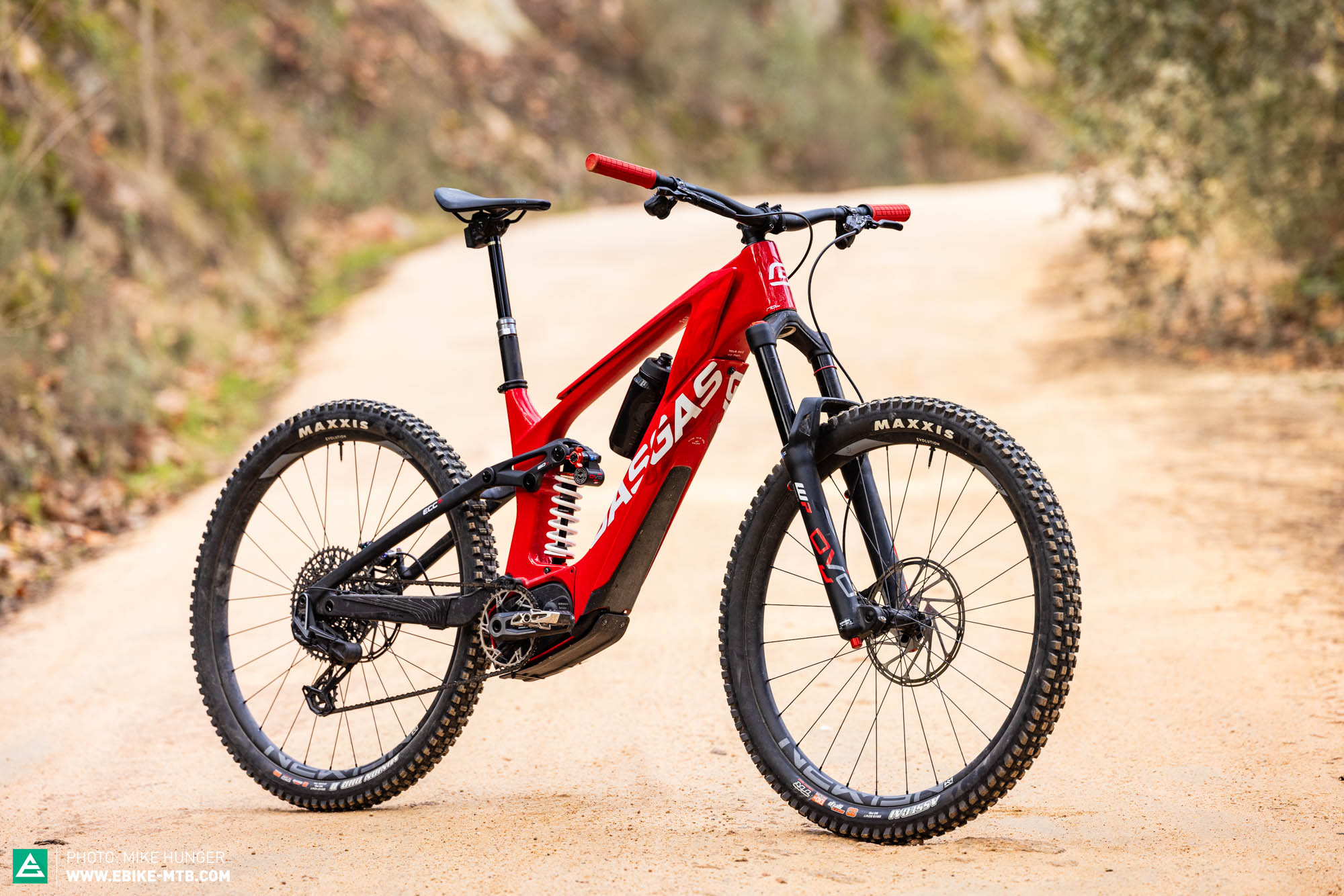
GASGAS ECC 6
€ 9,999
Specifications
Motor SRAM Eagle Powertrain 90 Nm
Battery SRAM Eagle Powertrain 630 Wh
Display SRAM AXS Bridge Display
Fork DVO Onyx D1CV OTT 170 mm
Rear Shock DVO Jade X VC Coil 160 mm
Seatpost RockShox Reverb AXS 170 mm
Brakes SRAM CODE Ultimate Stealth 220/200 mm
Drivetrain SRAM GX Eagle AXS Transmission 1x12
Stem NEWMEN EVOLUTION 40 mm
Handlebar NEWMEN ADVANCED 800 mm
Wheelset NEWMEN EVOLUTION SL E.G. 30 29"
Tires MAXXIS ASSEGAI, MaxxGrip, EXO+/MAXXIS Minion DHR II, MaxxTerra, Doubledown 2.5/2.4
Technical Data
Size S/M M/L L/XL
Weight 24.6 kg
Perm. total weight 130 kg
Max. payload (rider/equipment) 105 kg
Trailer approval no
Kickstand mount no
Specific Features
Frame cover
Tuning tip: Download the WP/DVO setup guide, and take time doing your setup
What is the 2024 GASGAS ECC 6 capable on the trail?
When setting off with the GASGAS, there’s no ears-shattering exhaust noise banging on your helmet, but the pleasant chirping noise of the electronic drivetrain keeping you company, with the SRAM Powertrain motor ensuring an excellent uphill performance. The GASGAS ECC 6 places you in a comfortable, balanced pedalling position, with only a slight pressure on your hands, which quickly vanishes as soon as the gradient steepens. However, there are only two support modes to choose from, which can be a bit disappointing when you tackle technical climbs. The motor pushes smoothly yet eagerly but, if you come from a bike with Bosch’s CX Race motor, like the Pivot Shuttle AM, you’ll miss the quick response of the Race mode, but in return you’ll be rewarded with a more natural ride feeling. The coil shock works sensitively and reliably, ensuring a high level of touring comfort together with the Autoshift function. On technical climbs, the automatic drivetrain is overwhelmed, struggling to shift into the right gear on unexpected gradients – you’re better off bypassing it and riding in manual mode.
Covering without hiding… the plastic panels of the GASGAS make it even more of a head tuner than the bright red paint finish and white branding.
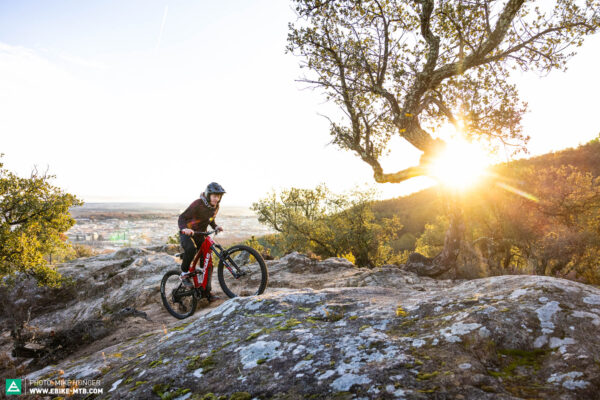
The SRAM motor pushes you uphill naturally and discreetly, but doesn’t deliver the same punch as the Bosch CX Race drive.
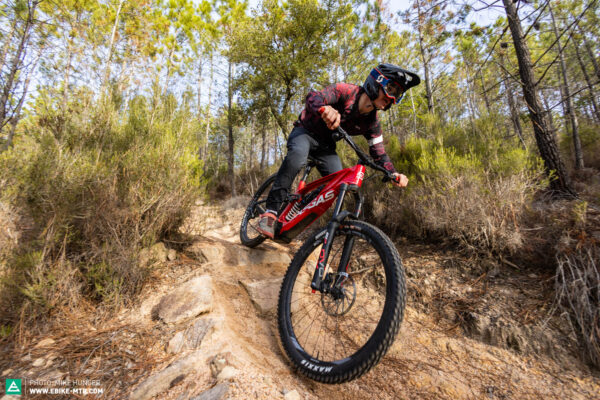
The high front end of the GASGAS requires an active riding style and lots of weight shifting.
When gravity takes over, the drivetrain has even more features to offer. The Coast Shift function allows you to shift into the right gear without having to pedal and while keeping your cranks in a stable horizontal position, thus minimising the risk of snagging your pedals on roots or rocks. In a nutshell, the motor spins the chainring while the derailleur shifts, which allows you to shift into the right gear in anticipation of corners and obstacles – awesome! Handling is intuitive and very composed, meaning that the GASGAS prefers to plough its way back down into the valley in a straight line rather than down a tight, twisting trail, because the suspension sucks up the rider’s input like a sandbag with every change of direction and in every compression, requiring significantly more physical effort than its direct competitors, like the Lapierre Overvolt GLP. As a result, the GASGAS encourages a rather passive riding style, making you wish that you had a gas throttle on your right hand to pick up speed without pedalling. On steeper trails, the high, MX-style front end inspires huge amounts of confidence, while the suspension always sits high in its travel. With the right settings, the GASGAS also provides huge reserves, effortlessly gobbling up bigger hits and thus making it easy to stick to your line. But there’s a downside to the high front end: with quick, consecutive direction changes, you have to actively weight the front wheel to keep it tracking. However, to do this, you can’t simply slide forwards on the long moto seat, but have to get into a deep push-up position. Pleasing: The motor is rattle-free compared to other full-power eMTB motors on the descent.
With the GASGAS, you’ll have to actively weight the front wheel sometimes. However, here you can’t just slide to the front of the long motorbike seat and just stretch your legs!
| Size | S/M | M/L | L/XL |
|---|---|---|---|
| Top tube | 588 mm | 613 mm | 638 mm |
| Seat tube | 400 mm | 440 mm | 470 mm |
| Head tube | 115 mm | 130 mm | 145 mm |
| Head angle | 64° | 64° | 64° |
| Seat angle | 74,7° | 75,2° | 75,5° |
| Chainstays | 461 mm | 465 mm | 469 mm |
| BB Drop | 31,5 mm | 31,5 mm | 31,5 mm |
| Wheelbase | 1.257 mm | 1.289 mm | 1.325 mm |
| Reach | 450 mm | 475 mm | 500 mm |
| Stack | 649 mm | 663 mm | 676 mm |
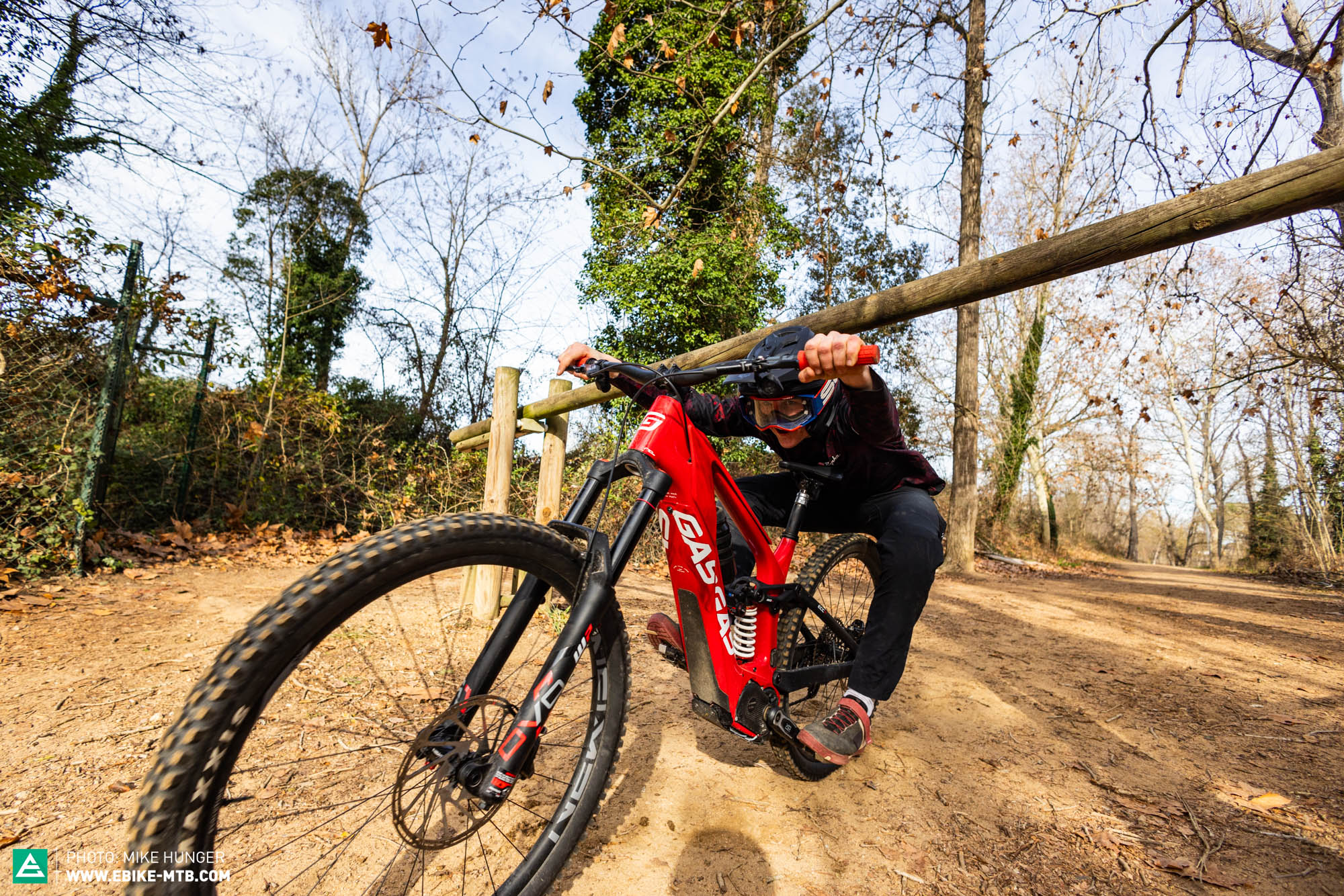
Who should take a closer look at the 2024 GASGAS ECC 6 and who should look elsewhere?
The ECC 6 clearly appeals to old-school GASGAS nostalgics who love the bold styling. Since the Spanish company’s eMTB inspires huge amounts of confidence, it’s also a good choice for beginners. Touring fans will be impressed by the bike’s plush coil shock, comfortable riding position and, of course, the practical Autoshift function.
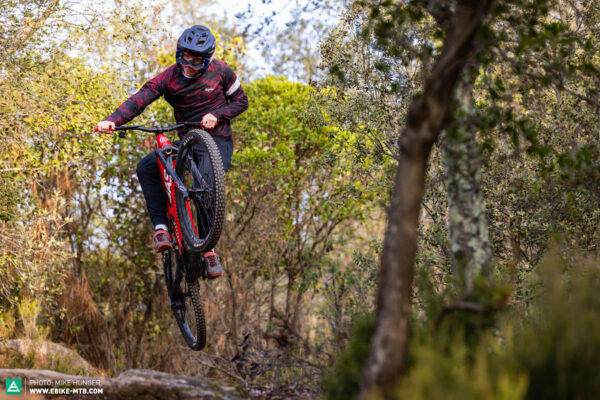
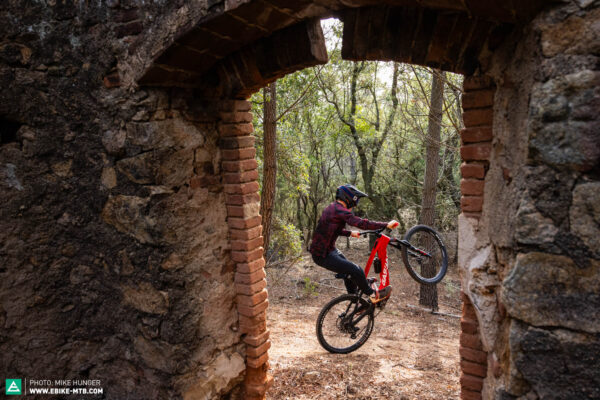
Riding Characteristics
DESIGN
- unbalanced
- coherent
USER FRIENDLINESS
- cumbersome
- clever
VALUE FOR MONEY
- flop
- top
TREKKING & COMMUTING SUITABILITY
- low
- high
HANDLING
- demanding
- intuitive
FUN FACTOR
- boring
- lively
Intended Use
Gravel roads
Technical climbs
Flowtrail descents
Technical descents
Our conclusions about the 2024 GASGAS ECC 6
The ECC 6 is obviously neither a full-blown motocross bike nor a race eMTB. However, GASGAS’ eMTB inspires huge amounts of confidence, which comes in handy particularly for beginners. However, next to the rest of the 2024 eMTB test field, it lacks agility and riding fun, which only materialises with a very active riding style. On the other hand, the GASGAS is great for longer rides, which is reinforced by practical features like the Autoshift function.
Tops
- High front end inspires huge amounts of confidence
- Unique design with a touch of moto-nostalgia
- Motor is quiet downhill
Flops
- The high front end requires you to actively shift your weight in open corners
- Sluggish handling
- Unique design is a matter of taste
For more information, visit gasgas.com
The test field
For an overview of the test fleet head to the group test: The best eMTB of 2024 – 27 of the most exciting models in our comparison test
All bikes in test: BULLS VUCA EVO AM 2 (Click for review) | BULLS SONIC EVO AM SX-I (Click for review) | Canyon Strive:ON CFR LTD (Click for review) | Canyon Torque:ON CF Roczen (Click for review) | CENTURION No Pogo SL R8000i (Click for review) | CUBE AMS Hybrid ONE44 (Click for review) | FLYER Uproc X 8.70 (Click for review) | FOCUS SAM² 6.9 (Click for review) | GASGAS ECC 6 | GIANT Trance X Advanced E+ Elite 0 (Click for review) | KTM Macina Scarp SX Prime (Click for review) | Lapierre Overvolt GLP3 (Click for review) | Merida eOne-Sixty 10K (Click for review) | Mondraker Neat RR SL (Click for review) | Moustache Samedi 29 Game 11 FOX (Click for review) | Orbea WILD M-LTD (Click for review) | Pivot Shuttle AM Team (Click for review) | Propain Ekano 2 CF (Click for review) | RADON RENDER 10.0 HD (Click for review) | ROTWILD R.X 1000 Ultra (Click for review) | Santa Cruz Heckler SL XX AXS RSV (Click for review) | SCOR 4060 ST (Click for review) | SCOTT Voltage eRide 900 Tuned (Click for review) | SIMPLON Rapcon Pmax Pinion (Click for review) | Specialized Turbo Levo SL Expert (Click for review) | Specialized Turbo Levo Pro (Click for review) | Spherik E-SMT XX AXS (Click for review)
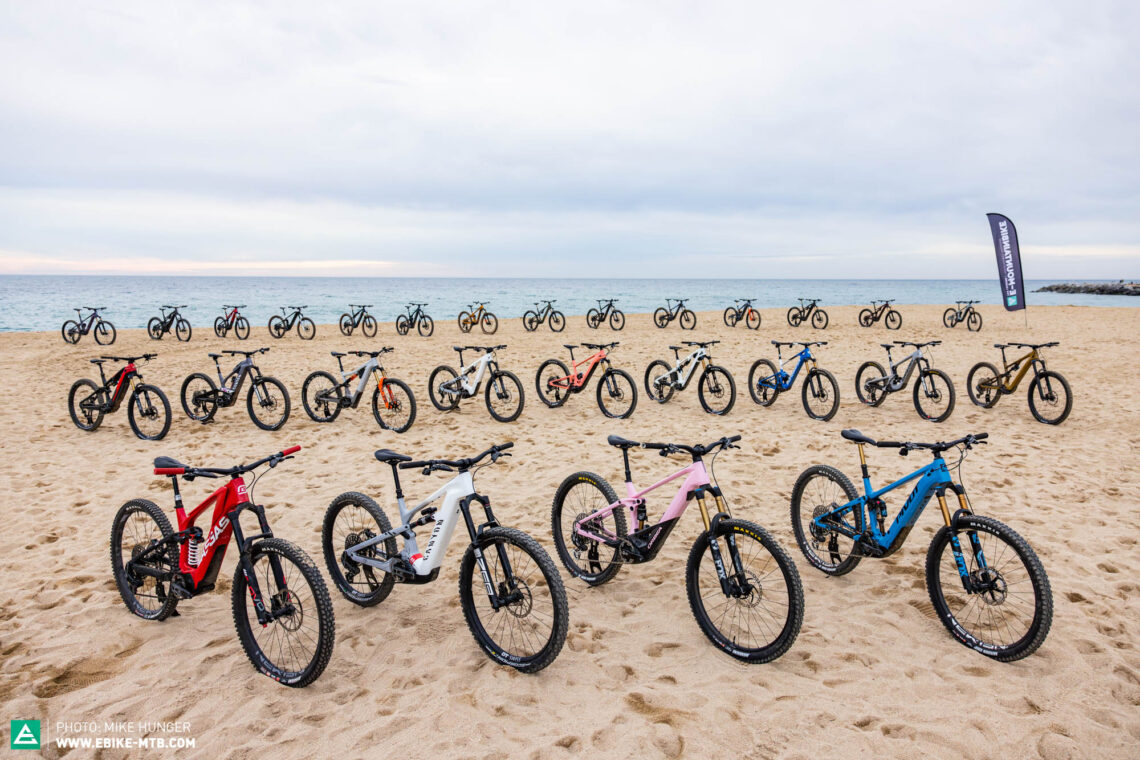
Did you enjoy this article? If so, we would be stoked if you decide to support us with a monthly contribution. By becoming a supporter of E-MOUNTAINBIKE, you will help secure a sustainable future for high-quality cycling journalism. Click here to learn more.
Words: Julian Schwede Photos: Mike Hunger





